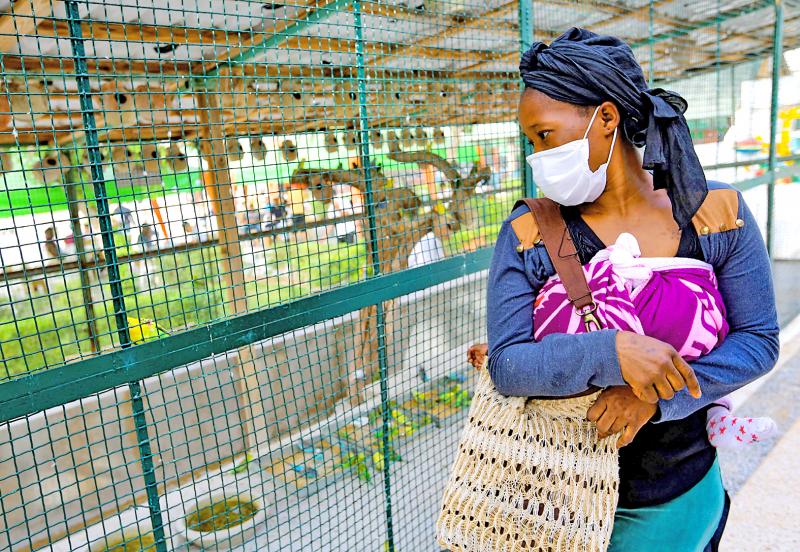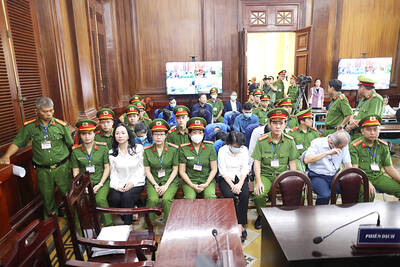For Aisha, sexual slavery was something you only heard about happening to others in TV reports, until she found herself locked in a living “hell” in Libya.
“I had left a nightmare only to fall into hell,” said the migrant from Guinea, lured to the North African country that criminal gangs have turned into a den of racketeering.
Aisha fled her home country after five miscarriages: For her in-laws and the neighborhood, she was either sterile or a witch — but the young woman was simply diabetic.

Photo: AFP
“I just wanted to disappear from my country,” said Aisha, a graduate in hotel management.
She got in touch with a former classmate who appeared to have made a life for herself in Libya and who lent Aisha money to join her.
“I didn’t even see the country. As soon as I arrived, I was locked up, I was a slave. She brought men to me and she got the money,” she said.
Locked in a room with a toilet, she only saw the “friend” who had duped her when she was brought in food, as is being a dog, Aisha said.
“The men came drunk. I’d rather not remember it,” she said, still trembling. “I thought my life was over.”
After three months, a Libyan man took pity on her, threatened her captor and put Aisha on a bus to Tunisia with 300 dinars (US$67) in her pocket.
After her diabetes was treated, she even gave birth to a baby girl late last year.
She now dreams of Europe, but returning to Libya is out of the question.
“I wouldn’t wish that on my worst enemy,” Aisha said.
For the past two years, she has lived with other migrant women in Medenine, southern Tunisia.
Most of the others who experienced Libya had also been forced into prostitution, raped or sexually assaulted, said Mongi Slim, head of the local Red Crescent chapter.
“Some of them, if they had the protection of a man, they fared better. But for single women, it’s almost systematic,” Slim said.
Some migrants have told UN investigators that they had been advised to take a three-month contraception jab before departure, and some travel with morning-after pills, a UN report said.
Mariam, an Ivorian orphan, left with 1,000 euros (US$1,186) to pay for the crossing from Abidjan to Libya via Mali and Algeria.
The 35-year-old hoped to earn enough in Libya to reach Europe.
However, she ended up spending most of her year there in prison, where she was sexually exploited, before fleeing to Tunisia in 2018.
“I worked for six months with a family, then I set off by sea from Zuwara,” in western Libya, Mariam said. “Armed men caught us, took us to prison and abused us.”
Mariam said she had fallen into the hands of militants who run illegal migrant camps where extortion, rape and forced labor are common.
Official centers under Libyan government control, and where an EU-funded coastguard transfers would-be exiles it intercepts, are also riddled with corruption and violence, including sexual assault, the UN said.
“Every morning, a chief would make his choices and send the chosen girls to Libyans who had rented special rooms,” Mariam said.
“They fed me bread, sardines and salad. I stayed there a month until they moved me to another place,” she said. “They were armed, they smoked drugs, they paid the chief, but not me.”
Rights groups say that men and boys are also sexually abused.
“Sexual violence continues to be perpetrated with impunity by traffickers and smugglers along migration routes, in detention centers, judicial police prisons, and against urban migrants by militants and armed groups”, the UN said.
Such criminality increased with the intensification of the Libyan conflict from 2014.
Three migrant detention centers in Libya were closed in the middle of 2019, and the establishment in March of a new UN-sponsored transitional government has raised hope of a decline in impunity and violence.
The UN decided last year to deploy protection officers to combat sexual crimes, but they have yet to even be recruited, and intercepted migrants are still turned back to Libya, to the dismay of international organizations.
On June 12, a record of more than 1,000 people caught at sea were sent back to Libya, the UN said.

Republican US lawmakers on Friday criticized US President Joe Biden’s administration after sanctioned Chinese telecoms equipment giant Huawei unveiled a laptop this week powered by an Intel artificial intelligence (AI) chip. The US placed Huawei on a trade restriction list in 2019 for contravening Iran sanctions, part of a broader effort to hobble Beijing’s technological advances. Placement on the list means the company’s suppliers have to seek a special, difficult-to-obtain license before shipping to it. One such license, issued by then-US president Donald Trump’s administration, has allowed Intel to ship central processors to Huawei for use in laptops since 2020. China hardliners

A top Vietnamese property tycoon was on Thursday sentenced to death in one of the biggest corruption cases in history, with an estimated US$27 billion in damages. A panel of three hand-picked jurors and two judges rejected all defense arguments by Truong My Lan, chair of major developer Van Thinh Phat, who was found guilty of swindling cash from Saigon Commercial Bank (SCB) over a decade. “The defendant’s actions ... eroded people’s trust in the leadership of the [Communist] Party and state,” read the verdict at the trial in Ho Chi Minh City. After the five-week trial, 85 others were also sentenced on

‘DELUSIONAL’: Targeting the families of Hamas’ leaders would not push the group to change its position or to give up its demands for Palestinians, Ismail Haniyeh said Israeli aircraft on Wednesday killed three sons of Hamas’ top political leader in the Gaza Strip, striking high-stakes targets at a time when Israel is holding delicate ceasefire negotiations with the militant group. Hamas said four of the leader’s grandchildren were also killed. Ismail Haniyeh’s sons are among the highest-profile figures to be killed in the war so far. Israel said they were Hamas operatives, and Haniyeh accused Israel of acting in “the spirit of revenge and murder.” The deaths threatened to strain the internationally mediated ceasefire talks, which appeared to gain steam in recent days even as the sides remain far

RAMPAGE: A Palestinian man was left dead after dozens of Israeli settlers searching for a missing 14-year-old boy stormed a village in the Israeli-occupied West Bank US President Joe Biden on Friday said he expected Iran to attack Israel “sooner, rather than later” and warned Tehran not to proceed. Asked by reporters about his message to Iran, Biden simply said: “Don’t,” underscoring Washington’s commitment to defend Israel. “We are devoted to the defense of Israel. We will support Israel. We will help defend Israel and Iran will not succeed,” he said. Biden said he would not divulge secure information, but said his expectation was that an attack could come “sooner, rather than later.” Israel braced on Friday for an attack by Iran or its proxies as warnings grew of